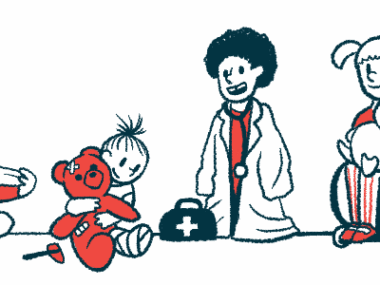A group home has benefited my son with Prader-Willi syndrome
Despite my fears, Robert's placement was the best decision for our family
Written by |

When Robert, my son with Prader-Willi syndrome (PWS), was small, any mention of group homes would cause my stomach to clench in fear. What would the future hold for our darling little boy?
Group home living seemed limiting. We hoped our son would at least receive a college education, find a job, and make friends.
But when Robert was 19, placing him in a group home became our only solution. He had become mentally ill, and we could no longer manage his behavior. We were lucky to find a placement at Stepping Out, located in Hastings, Minnesota. This is a group home specifically for people with PWS.
Our state has one of the longest histories of group homes for people with the syndrome. The Oakwood Residence was one of the earliest, serving 15 people from 1980 until 2001. Today, AME Community Services operates more than 10 PWS-specific homes in Minnesota.
Group homes provide predictability for residents with PWS. Kitchens are locked. Access to food is limited to meals and snacks. Food is served at the same time each day to prevent anxiety.
Staff are trained to manage meltdowns effectively and de-escalate situations, ensuring the safety of residents. They also learn how to cope with the anxiety and mental illness that can affect people with the syndrome. Skin-picking behaviors are also common in people with PWS, so supervising residents closely and redirecting such behaviors is part of the staff’s job.
Exercise and food rewards play a significant role in the Stepping Out program. Food is used as a motivator. Residents earn dinners out, ice cream, and pizza parties for completing each week’s exercise program.
Sixteen years ago, I attended a Prader-Willi Syndrome Association | USA conference, where I connected with parents from across the country. I learned that many states had no group homes, which surprised and saddened me. Adults with PWS sometimes have complex problems that would make family-managed care quite difficult.
If you live in an area where no care is available, it’s possible to start your own group home. Information is available regarding staffing, exercise, programming, and diet. Some states may help cover living expenses not covered by Supplemental Security Income, but laws and funding vary. You will need to consult with a lawyer and work with a social worker.
Two families I know couldn’t find a placement for their children with PWS, so they started a four-person group home. Of course, this is not an easy task. But providing daily care for adult children is often too much for aging parents. Now that I’m no longer caring for Robert every day, I feel like I’m on vacation!
Because placement is limited, some people with PWS move out of state to live in a group home. For parents, this can mean limited access to your child. You would have to travel to see them, as it’s too risky for them to travel to you.
Consider how people with PWS benefit from being around others who understand what they experience. We all enjoy socializing with like-minded people. You can again have a parent-child relationship instead of being a police officer!
Note: Prader-Willi Syndrome News is strictly a news and information website about the disease. It does not provide medical advice, diagnosis, or treatment. This content is not intended to be a substitute for professional medical advice, diagnosis, or treatment. Always seek the advice of your physician or other qualified health provider with any questions you may have regarding a medical condition. Never disregard professional medical advice or delay in seeking it because of something you have read on this website. The opinions expressed in this column are not those of Prader-Willi Syndrome News or its parent company, Bionews, and are intended to spark discussion about issues pertaining to Prader-Willi syndrome.






Leave a comment
Fill in the required fields to post. Your email address will not be published.